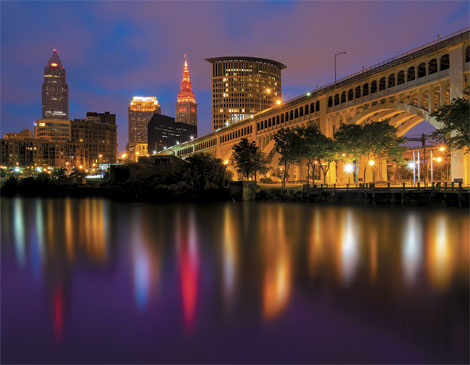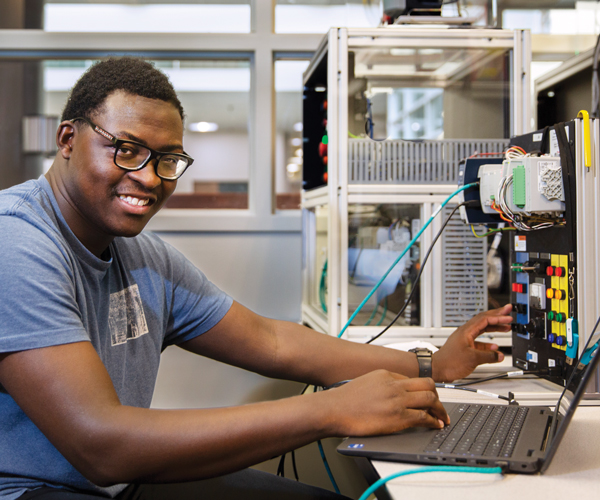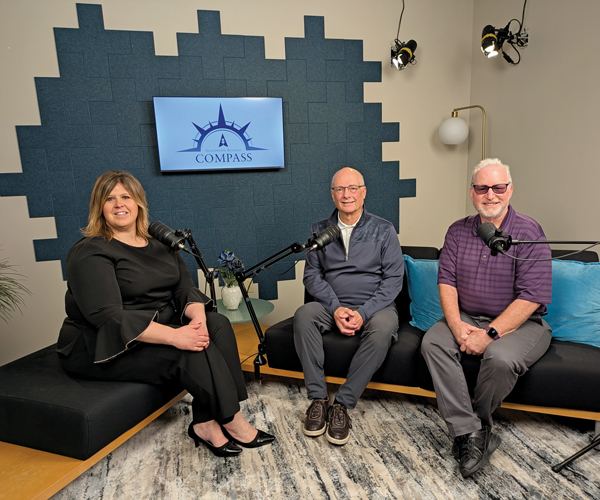For too many years, our city was like Sisyphus pushing a boulder to the top of the hill, victory within our grasp, only to have it tumble back down and crush us. And like Sisyphus, we would gather ourselves from the dust and begin pushing that boulder of public perception slowly back up the hill.
But this time, a tipping point has been reached. This time, through a Herculean collaborative effort on the part of government, nonprofits and private corporations, the perception of our city has fundamentally changed.
This time the prize has been won. And it starts in Cleveland on July 18, when more than 50,000 delegates, another estimated 15,000 credentialed journalists and countless others descend upon Cleveland for the 2016 Republican National Convention.
“Let’s just say I’m happy this isn’t a sports event,” quipped one prominent Clevelander who requested anonymity lest he offend our town’s never-say-die sports fans.
Funny? Yes. But it still represents the view of many people across Northeast Ohio who, for some reason, can’t accept the fact that Cleveland has actually won a very valuable prize — a venue contest that many consider to be second only to hosting the Olympics. What a lot of people don’t realize is that we already took home the Silver Medal, twice.
Valerie McCall, chief of government and international affairs for the City of Cleveland, has been involved from the onset with the city’s most recent bids to secure a national political convention. In 2006, the city was one of the finalists for the 2008 Republican National Convention.
Following the city’s failed bid in 2008, a team comprised of city and county governments, nonprofits and private-sector companies came together and asked the Republican National Committee (RNC) what we could do to improve.
“It was kind of like getting a bad grade in class and then going to the teacher and asking what you can do to be a better student,” says McCall.
They asked the right people, too. Many of the consultants working with the RNC back when Cleveland failed are the very same consultants who played an important part of the selection process this time around. That included Jeff Larson, who was tapped by RNC Chairman Reince Priebus to serve as the CEO for the 2016 National Convention and RNC Committee on Arrangements.
“When we sat down with them, they told us we needed more hotels downtown and the right kinds of venues,” says McCall. “All the things they told us, we took to heart.”
Cleveland also tried to win a national convention in 2010, but lost this time to Charlotte, North Carolina, for the 2012 Democratic National Convention. Once again, representatives went down to see how the city could improve its pitch.
“But this time we had a convention center that was coming online, so we had a lot of new things to talk about,” says Nathan Kelly, director of innovation and strategic initiatives for Cuyahoga County. “Our county executive, who at the time was Edward FitzGerald, went down to Charlotte with David Gilbert, and that redoubled our efforts to make sure we landed a national convention here by 2016.” Gilbert is president and CEO of Destination Cleveland and the Greater Cleveland Sports Commission.
It also helped that Cleveland was on the path to becoming a world-class destination for conventions, thanks in large part to the work of nonprofit organizations like Destination Cleveland and the Downtown Cleveland Alliance.
Five years ago, construction cranes began to appear against the Cleveland skyline. Hotels began to sprout, including Aloft Cleveland Downtown, The Metropolitan at The 9, The Kimpton Schofield Hotel and the new Hilton Cleveland Downtown, which was built by Cuyahoga County with a price tag topping $272 million.
Over the past five years, Cleveland has seen more than $16.7 billion worth of public and private investments in Northeast Ohio’s infrastructure, including the inner-belt bridges and the redesign of Public Square. More than $3.5 billion has been spent on visitor-related infrastructure alone. In total, downtown Cleveland will have 18 hotels when the RNC convention hits town this summer.
Added to the mix are the massive expansion of the Cleveland Museum of Art, construction of the Museum of Contemporary Art and the rebirth of close-by neighborhoods like Tremont, Ohio City and the Flats East Bank — a mixed-use development that represents an investment of more than $750 million from private developers the Wolstein Group and Fairmount Properties.
With all that new construction in its back pocket, it’s easy to see how Cleveland wrestled away the 2016 Republican National Convention from such cities as Denver, Dallas, Kansas City, Las Vegas and Phoenix.
“I am also sure that locating a convention in Cleveland, in an important county, in an important state, during a presidential election, played some role,” says Kelly. “But it also helped that Cleveland is a community that is eager to be host.”
Hosting the convention will require cooperation from city and county governments, nonprofit organizations and the private sector. Enter the Cleveland 2016 Host Committee.
This strictly nonprofit, non-political entity has been tasked with the mission to organize, host and fund the actual convention. While the RNC’s Committee on Arrangements coordinates the activities of the Republican Party, it’s the Host Committee’s job to see that our community meets all the convention and visitor needs.
The 2016 Host Committee uses an integrated approach to utilize the expertise of existing organizations. It’s comprised of three tiers of leadership representing the private sector, government officials and nonprofits. The executives involved with the Host Committee read like a Who’s Who of community leaders.
Its officers include David Gilbert, who serves as the Host Committee’s president and CEO; Joseph Roman, who serves as the Host Committee’s vice president; and Jon Pinney, the committee’s counsel, secretary and treasurer. Roman is president and CEO of the Greater Cleveland Partnership. Pinney is managing partner of Kohrman, Jackson & Krantz LLP.
Public officials include Mayor Frank Jackson and Valerie McCall, as well as Armond Budish, county executive of Cuyahoga County, and Sharon Sobol Jordan, chief of staff of Cuyahoga County. Then there are also the four 2016 Host Committee co-chairs: Christopher Connor, executive chairman of Sherwin-Williams; Chris Kelly, partner-in-charge of Jones Day; Alexander Cutler, chairman and CEO of Eaton Corporation; and Beth Mooney, chairman and CEO of KeyCorp.
The four private sector co-chairs act like a board of directors for the Host Committee, while day-to-day operations are handled by Gilbert and his teams. Getting involved was an easy decision for each co-chair.
“Our firm is global, but its roots have always been here in Cleveland,” says Kelly from Jones Day. “This is also another way for us to demonstrate to the community just how important this city is to us."
“Headquartered in Cleveland, with more than 6,000 local employees, KeyBank has been committed to the region’s economic development and revitalization,” adds Mooney. “Joining the committee in support of the [convention] was a natural fit.”
The Host Committee’s activities also dovetail nicely with the mission of Destination Cleveland.
“As the Convention & Visitors Bureau (CVB) of Greater Cleveland, Destination Cleveland’s mission is to drive economic impact and stimulate community vitality through business and leisure travel,” says Gilbert. “Simply stated, our job is to bring visitors to Northeast Ohio to experience the region’s hospitality industry and to enhance their experience by providing visitor-related services via our Cleveland Visitors Center, online concierge and newly installed wayfinding system.”
To that end, Destination Cleveland has borrowed a page from the playbook of Downtown Cleveland Alliance (DCA). As a part of its mission to improve the quality of life for residents, workers and visitors to downtown, the DCA has a team of ambassadors who help keep our streets clean and safe.
“It’s one of our signature programs,” says Joe Marinucci, president and CEO of the DCA. “These are people who are working on day-to-day basis to patrol the streets of downtown through our safety program, who also maintain our sidewalks and pubic areas, keeping them clean and free of graffiti.
“But they also provide what I would like to call concierge services. If you lock your keys in your car, we can help you unlock the door. If you have a breakdown while you’re in town, we’ll call AAA. If you have a flat tire, we’ll help you change it.”
It’s a great concept that will be expanded when the convention comes to town. Cleveland 2016 Host Committee is currently building a volunteer force of some 8,000 ambassadors to augment what the DCA ambassadors are already doing. They will act as greeters and city ambassadors at the airport, hotels, convention sites, private venues and other places where convention attendees are likely to visit.
With any event this size, there are bound to be a few bumps in the road. There have been reports concerning a lack of security participation from surrounding communities and preparedness planning. Other stories have discussed expected road closures and traffic re-routing. All are topics that cannot be commented on by government officials, which, in turn, leads to speculation that they may be hiding something.
“You have to remember, this is a national security event,” says McCall. “There’s simply no way, realistically or logically, that the city nor the Cleveland Division of Police will talk in detail about what their operations are, because then it would not be a national security event. It would be front-page news.”
Dissemination of such information is diametrically opposed to national security protocols. Even when contacted by members of the press, a city official, or anyone involved with convention planning, simply can’t discuss security planning, according to the U.S. Secret Service — and this isn’t exactly the organization’s first rodeo with a national security event. The agency is happy with the way the plan is evolving and the preparations thus far.
“Any reporting of traffic, street, parking or road closures this early in the [convention] planning process would be premature and speculative,” says Kevin Dye, spokesperson for the U.S. secret Service. “Only through intense planning, communication and training can an event of this magnitude be secured successfully. We would like to thank the City of Cleveland for their partnership in assisting us with our planning.”
There also have been reports of Cleveland using its $50 million grant from the U.S. government to buy 2,000 sets of riot gear, riot control suits and collapsible batons and other equipment — all of which are supported by public documents.
“But the items we are bidding on are items that might be needed,” says McCall. “They’re specialty items and not the kinds of things you can buy the night before.”
There even have been stories about how the event might fail and our city could lose face if it becomes a “brokered” or contested convention. But that will happen inside the convention and not on the streets. And it will not denigrate the convention or our city’s efforts in hosting it.
Are all of these stories true, or are they really just feeding our own misplaced fears that as a community, somehow we are not worthy?
In the end, the Herculean effort that went into winning the bid and hosting the 2016 Republican National Convention will have a dramatic positive impact on our city’s future. So far, officials at the RNC’s Committee on Arrangements are satisfied.
“The city of Cleveland has been a great partner to the Committee on Arrangements for the 2016 Republican National Convention. Through the process, the city has made many improvements that will help make the convention successful and will benefit the city of Cleveland long term,” says Jeff Larson, CEO of the RNC’s Arrangements Committee. “We will welcome more than 50,000 people from all over the world, including 15,000 media members and thousands of volunteers who will help make Cleveland shine. The convention is providing years of exposure for Cleveland and a chance to build a positive, lasting impression with convention-goers, guests, media and millions of viewers at home.”




